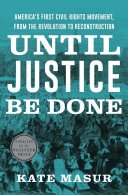Until Justice Be Done: America’s First Civil Rights Movement, from the Revolution to Reconstruction

Top of the pile
79
/100
I Index Overall Rating

Readers
Critics
Scholars
Author:
Kate Masur
Publisher:
W. W. Norton & Company
Date:
March 23, 2021
A history of the movement for equal rights that courageously battled racist laws and institutions, Northern and Southern, in the decades before the Civil War.
What The Reviewers Say
Jennifer Szalai,
The New York Times Book Review
The New York Times Book Review
There are several themes that emerge in this excellent book. The first has to do with how African-Americans led the struggle Masur describes, even as racially discriminatory laws made them vulnerable — whether to the whims of local officials exerting their discretion or to white mobs seeking legal cover for anti-Black violence. Another concerns how the language of race and class was, as Masur puts it, 'fungible': Even after the Civil War, legislation cracking down on 'vagrancy' and 'vagabondage' allowed state legislatures in the former Confederacy to practice discrimination under cover of laws that seemed 'race-neutral.' So much in this history was contingent; so much could turn on a single word. Toward the end of her book, Masur describes the debates over the Civil Rights Act of 1866, when senators haggled over who would be protected against racial discrimination, deciding to replace the inclusive word 'inhabitants' with the more restrictive 'citizens.'.
John Fabian Witt,
The Washington Post
The Washington Post
Masur wants to know what led increasingly influential politicians to adopt the view that Black people ought to 'have all the rights and privileges and immunities' that 'every citizen' had. In Masur’s account, the answer is a now-forgotten social mobilization of Black civil rights advocates who fought alongside White allies not only to undermine slavery but to establish basic equality for Blacks in the free states of the North.
Harold Holzer,
The Wall Street Journal
The Wall Street Journal
Prodigiously researching legislative and court records, pamphlets, petitions, and the press, [Masur] has shaped a remarkable and shattering book, a worthy successor to Ira Berlin’s 1974 Slaves Without Masters. Ms. Masur’s monumental account focuses not only on government-sanctioned pre-Civil War racism, but on the efforts by black activists and their white allies to compel America to make good on the 'created equal' pledge in the Declaration of Independence.
Jim Swearingen,
The National Book Review
The National Book Review
Masur is another in a valiant legion of historians who continue to fill in gaps in our knowledge of the ancestry of American fascism from southern slave-owners to present-day insurrectionists, the defiant Know-Nothings who have never held allegiance to democratic principles when they challenged racial hegemony. Her work also reminds us that America has always garnered more loyalty from Black Americans, pushing the nation to fulfill its egalitarian promises, than the nation has shown them in return. That yin and yang of our schizophrenic political system continues to play out in a tension that we seem far from resolving..















